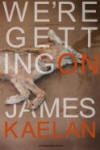We’re Getting On
James Kaelan’s We’re Getting On opens with an inscription that reads, “This book is dedicated to Leslie Epstein who hated this novella, and to Ha Jin who was considerably more amenable.” This prelude is odd but apt, a warning that says,
James Kaelan’s We’re Getting On opens with an inscription that reads, “This book is dedicated to Leslie Epstein who hated this novella, and to Ha Jin who was considerably more amenable.” This prelude is odd but apt, a warning that says,
I am not a book that will court your love. I won’t whisper sweet nothings in your ear or drip sangria on your tongue. My protagonist is a bit of an asshole who goes on annoying tangents, so you probably won’t like him. I won’t set a clean comforting message in your palm. And you’re likely to be confused by my narrative arc. But bah, I don’t care. Read me or don’t.
This is quite a welcome, an anti-invitation of sorts. But read on you must because this is your rare chance at a book that won’t indulge you. And isn’t that refreshing? Yes, it might be a bit disorienting at first. But doesn’t the whole world coddle to your comfort? Why not read a book that will force you to do some thinking yourself?
In case you’re not convinced, here’s a quick bit about the plot. Kaelan’s narrator, who has disposed of his name but was formerly called Dan, leads his four “congregants” into the wilderness, an uninhabited two acres of overgrazed pasture far enough away from humanity so they can deprogram culture and civilization from their bodies and brains. The narrator explains:
I needed to go somewhere remote and uninviting, where I wouldn’t be disturbed. For a long time I’ve wanted to retire to the country. The city—its lights, its ineluctable machines—has exhausted me, physically and morally. I’m not looking for a quaint house with a garden. I want instead a refuge from everything I’ve ever learned or done or been reliant upon. One cannot prevent advancements, but one can remove himself from the parade.
At first, the premise seems Walden-esque, aside from the bit about not wanting a house and a garden. The narrator’s compatriots also seem to misinterpret their mission, envisioning a utopian dismissal of materialism and crowds, an embracing of nature and a more peaceful unaffected way of life. But this is not the narrator’s plan. He wants to rid himself of all social constructs, deconstructing mankind’s evolution, enacting backwards the steps they took to reach their present condition. “Purchase, garden, hunt, scavenge. That shall be our sequence,” he says. He is after a retardation of the species, a failure of the body, an end to thought. Quite literally, he wants to perform humanity’s demise. And if his corpse is later found, he wants it to be unrecognizable as human.
To that end, he watches as his congregants develop liver spots and bleeding, graying gums. Their parasite laden water makes them shit continually, which leads to dehydration and emaciation. The disintegration of their bodies is horrifying, but the narrator carries on, insists, “We’re getting on.” The periodic repetition of the title is a dark refrain, commenting ironically on the narrator and his congregants’ demise but more grandly on humanity’s. Kaelan seems to admonish our species with his title, which seems a euphemistic denial of the imminent catastrophe we’ve wrought. Kaelan’s title speaks a whole monologue on the planet’s behalf: “Oh sure, mate. We’re getting on, doing swell. Losing some teeth and going gaunt, but no worries. Just dig a hole and crawl in. We’ll all sleep well.”
Moreover, the physical text embodies its message. The cover of the novella is imbedded with spruce tree seeds, and rather than marketing itself with blurbs, the back cover lists instructions on “How to Plant This Book.” The text asks readers to plant it in order to restore some of the balance that has been disrupted by humanity’s fascination with its own voice. This is a text that wears its guilt on its shirt sleeve, a guilt at participating in language, in the destruction of trees, in the elevation of the human species above all others.
The narrator of the book has mixed emotions about his mission. He knows he cannot accomplish it truly. He says, “What a wonderful thought that is, trying to eradicate something. It’s an impossible concept, really. There are always vestiges.” Kaelan’s book is one of those vestiges. Its undertaking is enormous and though it knows it will not accomplish all it sets out to, it knows that remnants will linger. And for that, it is well worth the read.




